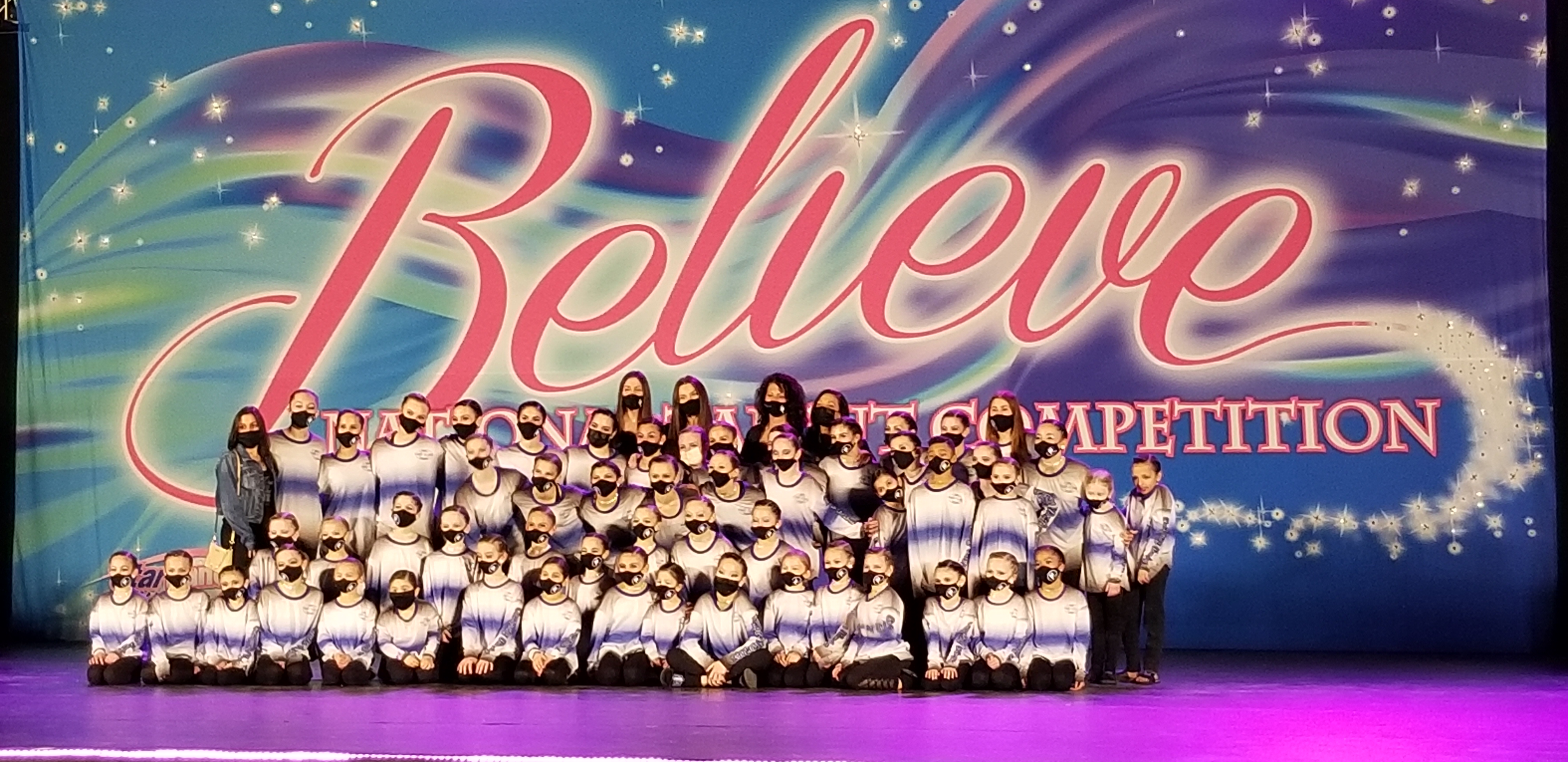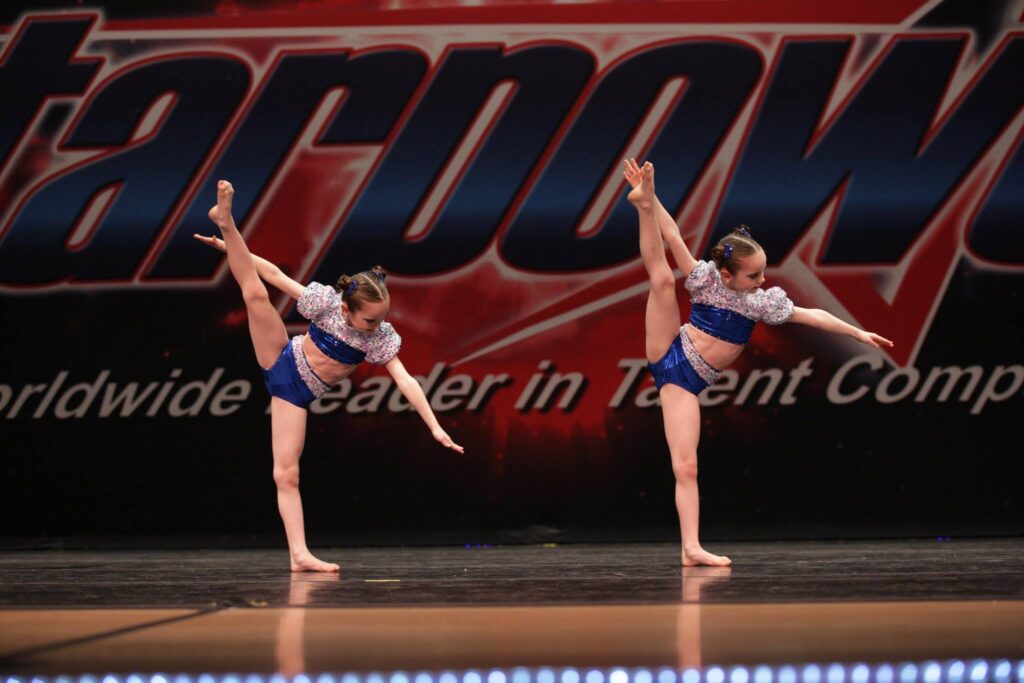When Teammates Compete with Each Other
When my girls were five, they were invited to audition for the dance studio’s new team. That first year, it was just eight little girls (I owned 25% of them). They would be competing just one routine, and none of them had any solos, duos, or trios. They were a cohesive unit, went nearly everywhere together, and were practically inseparable. That adorable little group shared every victory and let-down, every golden moment and low point. Those eight girls were as one.
As they grew older, some dancers joined duos/trios, some were offered solos, and some were brought up to the older team for certain numbers. This new dynamic meant that, in some cases, they would be dancing in the same division as their teammates. It didn’t take them long to realize that they would sometimes be competing against each other (a.k.a. “friendly fire”).
All in the Name
The nature of competitive dance is that it’s…well, competitive. A winner will always be crowned, and the rest of the dancers will have fallen short of reaching that first place slot. Quite frankly, there is no getting around that. And as much as you may have prepared your child for the likely outcome that they will not be the one standing on top of the podium, they will probably feel at least a twinge of regret when they aren’t the ones basking in that moment.
By no means am I suggesting that the only reason to compete is to win. But if we’re being honest, wouldn’t we ALL love for our kids to take that big trophy home (finding a place to put it is another matter)?
My girls have been on both ends of the spectrum, and I can definitively say that neither place is easy to occupy. When they have not done as well as they would have liked, and a teammate surpassed them in the overall rankings, I’ve seen them struggle to quell the green-eyed monster as they congratulated the other child. And when one of them has come out on top, the disappointment on the other soloists’ faces was easy to recognize.
From Within
If there are competing soloists (or duos/trios) on your dancer’s team, the dynamics become somewhat complex. These kids train together, spend countless hours in the studio together, and typically form bonds that are not easily broken. Dance team members learn to be interdependent for the good of the group, and being thrust together so often and so closely is par for the course.
Thankfully, these connections can provide a source of strength and support on competition day. We’ve been lucky enough that my girls’ teammates have always been enthusiastic cheerleaders in the wings and dressing room. In talking to moms from other studios, it seems like that’s very typical.
Naturally, however, there are times in which this just isn’t the case. I have personally seen dancers from the same team ignoring each other before they took the stage for their solos. No “good luck,” “break a leg,” or “merde” wishes, just stoic silence. While it’s understandable to give a performer space and solitude to get in “the zone” before going onstage, failing to take a brief moment to wish a teammate well is a missed opportunity to demonstrate poise, grace, and good sportsmanship.
Twinsight
As a twin mom, I knew there would be instances when my girls would struggle to establish an identity apart from her sister. What I couldn’t have possibly predicted, however, was how that would play out in the world of competitive dance. At first, they were offered a duo (and NAILED it, just sayin’). All their triumphs and obstacles were shared experiences, making them fairly easy to handle from a parenting perspective.
The next year, they were offered solos. As much as I was thrilled and proud that they were being given such an opportunity, I knew it would affect their relationship in some way. Truth be told, I was afraid of how they would handle it when one girl placed above her sister (gosh, I wish ties were more common).
Making the Commitment
Before we made the commitment, I sat both girls down to have a serious discussion (well, as serious as a discussion about dance solos can get with a pair of fun-loving seven year-olds). Long story short, I explained how one girl would always place above the other because that’s just the nature of dance competitions. I made it clear that, no matter how they were feeling, both girls had to outwardly act happy for her sister, demonstrate good sportsmanship, and compare herself only to herself (not her twin). Since both girls were beyond thrilled at the prospect of having a solo, they readily agreed.
Oh, what a naive fool I was. Okay, maybe that’s a little harsh – they actually did pretty well most of the time. Four years later, we still deal with some jealousy, but I’m pleased to report that they are (usually) genuinely happy for each other when they do well.

Compete Against Yesterday’s You
Honestly, I think what helps is the focus we place on each girl worrying only about herself. Frequently, I remind them that they have no control over what other dancers (including their sister or teammates) put on the stage, so they should invest their efforts into making their performance the best that they can personally do. “Be a little better than you were yesterday” is one of my favorite mantras; even though I’m sure they’re sick of hearing that, they seem to have internalized the message to some degree.
Redefine Success
If your dancer is struggling with an in-studio rivalry, it might be time to help them make an adjustment to their view of what “success” is. When we focus on non-trophy victories and goals (infusing more emotion into a piece, making sharper tap sounds, improving turn technique, etc.), that gives our kids something to strive for that they CAN control.
Naturally, your dancer will probably still be interested in their competitors’ performances, including those of their teammates. But by turning the focus inward, it may take some of their attention off of the external factors that are beyond their control. By no means should you encourage rivalries, so avoid comparing your dancer to others. It’s best that you guide your child to create goals for his/her own progress, and keep those in mind before taking the stage.
Final Thoughts
If the staff at your child’s dance school is stoking the fires to create heated rivalries among its team members, it might be Time to Say Goodbye (lookin’ at you, Abby Lee). Using intra-team competition to motivate children is a fine line to walk, and could prove too risky to be a worthwhile strategy. But if you feel like it’s being done in a positive, productive way (and not eroding your child’s self-esteem), then it might work to your dancer’s benefit. Having an honest discussion with your child can help shed some light on how they perceive it, and you can take your lead from there.

No matter what, your dancer should be cheering for all of their teammates regardless of whether they’re competing against them for solos, duos/trios, or groups. A helpful phrase I learned in my high school child care class was “All feelings are okay; all actions are not.” Let them know that their own personal feelings are valid, but they should always act with dignity and class. At the end of the day, regardless of who placed where, they are teammates.
Work hard, have fun! – Danielle



What a struggle, and yet what a great opportunity to grow and learn having to compete agains your own twin sister! My kids compete enough just running around the block. I’m glad your girls are usually happy for each other. That can strengthen bonds so much!
Good job Mom! Helping your child(ren) learn healthy competition is the best.
So many emotional struggles.. but also a great teaching tool We can’t win and be right all the time!❤
What a great teaching opportunity. I always wondered how the Williams sister dealt with this in the tennis world.
I just attended a middle school track meet a few days ago, and was really impressed by the way the kids cheered on and congratulated their teammates. I was never part of organized sports myself; this must be one of the great lessons learned.
What a great way to address competitions between teammates and siblings. One I wished me and my siblings learned. LOL Thanks for sharing.
Love the values you are teaching them. I know a few adults that could work on focusing on competing with themselves from yesterday instead of with each other. Teamwork instead of isolation 🙂
I like the idea of always competing with yourself and getting better and better everytime you compete.
Competition can be such a struggle, but it provides so many learning oppertunities.
What a great teachable moment!
What a great lesson. Learning good sportsmanship is an important lesson. And learning how to compete only with yourself (and not with your twin), is even more important. Difficult lesson – yes… invaluable – most definitely!
I love the ideas of defining success for yourself and to beat your personal best each day. These are timeless mindsets that every kid needs to develop!
Our best personal growth unfortunately occurs when we are being stretched.
I love that concept of competing against yesterday’s you. So much can be learned in losing. even if they both want to win. 🙂
Emotional struggles but I think this provides such good life lessons to create a strong and compassionate person.
In the world of competition, it is only natural to have some feelings of jealousy when you don’t come out on top. The key is how you handle those feelings. If we can teach our kids to acknowledge how they feel, but not let it overwhelm them and still have good sportsmanship, it’s a win.
Oh my that’s a fine line to walk. Good life lessons that can be applied elsewhere too!
These sound like such intense lessons to be learned by such young girls! Glad to hear that all of you are navigating it so well.
You are teaching them great values to grow with.
The hardest thing for a parent is when one daughter auditions and makes it and the other doesn’t. Yes, it’s a very raw teachable moment, but it’s so emotionally difficult!
I like the “be better than you were yesterday” attitude. The real competition is with ourselves…although we certainly don’t get awarded enough for that!